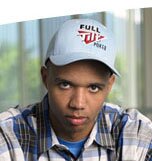Andy Bloch
January 23, 2006
I'm writing from Tunica, MS, where I've played in several World Series of Poker Circuit events at the Grand Hotel and Casino. A couple of days ago, I played in a $2,000 No-Limit Hold 'em tournament, and I saw some of my opponents make some pretty odd plays. For this tip, I decided to highlight a couple of these strange decisions and describe why you should avoid making similar plays.
A Curious River Raise
Midway through the tournament, I saw King-9 in the cutoff (the seat to the immediate right of the button). I raised to put some pressure on the blinds, and I was called by the big blind. The flop came T-5-2 rainbow, so it was no help to me. My opponent checked, and I checked behind him.
The turn was a 9, giving me a pair. He checked, and I made a small bet that he then called. The river was a King and I now had two pair. After my opponent checked and, thinking that I had the best hand, I made a substantial bet. At this point, he surprised me and made a large raise. I was reasonably sure I was up against a set or Q-J for the straight, but still, I made the crying call.
He showed pocket Aces and I took a nice pot.
What should my opponent have done?
For starters, he could have re-raised pre-flop, though calling pre-flop was certainly reasonable. He also could have taken the lead in the betting on the flop or the turn, not allowing free cards to hit the board. However, his real trouble came on the river.
When he check-raised, he failed to ask himself a critical question: What hand can I call with that he could beat? His river check-raise showed a lot of strength - so much, in fact, that I probably wouldn't have called with any one pair. By the river, he really had no idea what I was holding. For all he knew, I could have had Queen-Jack or any sort of two pair. If I held the straight, he'd be facing a very large raise, one that would certainly be a mistake to call.
In this sort of situation, his best play was to check-call on the river. By the time the river card hit, he should have been looking to showdown the hand with the hope that his pair survived.
While here, I've seen many players make similar mistakes on the river. They bet or raised with any hand that they suspected was best, including marginal cards like second pair. But their big mistake was that they failed to consider their opponent's hand. When you hold marginal cards, you should ask yourself two important questions: Do I have the best hand? And, if I do, does my opponent hold a hand that he's willing to call with? If you can't answer "yes" to both questions, just check the river and showdown the hand.
Trouble on the Turn
Later in the tournament, I raised pre-flop in late position with King-6 and the big blind called me. The flop came Ac-As-7s. I didn't have an Ace, but I bet anyway when my opponent checked. After he smooth-called and a 6h came up on the turn, my opponent bet big.
This play makes no sense because it doesn't tell a coherent story. A check-raise on the flop would be reasonable - my opponent would be representing a big hand, maybe trip Aces. A check-call on the turn would make sense, too. In that case, he probably holds a monster like a full house or he could just have a seven.
As it turned out, my opponent had A-7 (that's what he said, anyway), and by betting he forced me to fold. That wasn't very smart. If he checked, I might have continued with my bluff (though that-s unlikely).
In any case, it's almost never a good idea to check-call a flop bet, and then bet the turn if a blank hits. A play like that might confuse your opponent momentarily, but you're unlikely to gain much value. Your flop and turn bets should be related – they should tell a consistent story.
If you think carefully about your turn and river bets and what you're trying to gain, you're sure to improve your results. You'll get better value on the turn and avoid drowning on the river.
See you at the next tournament stop.
Andy Bloch
|



